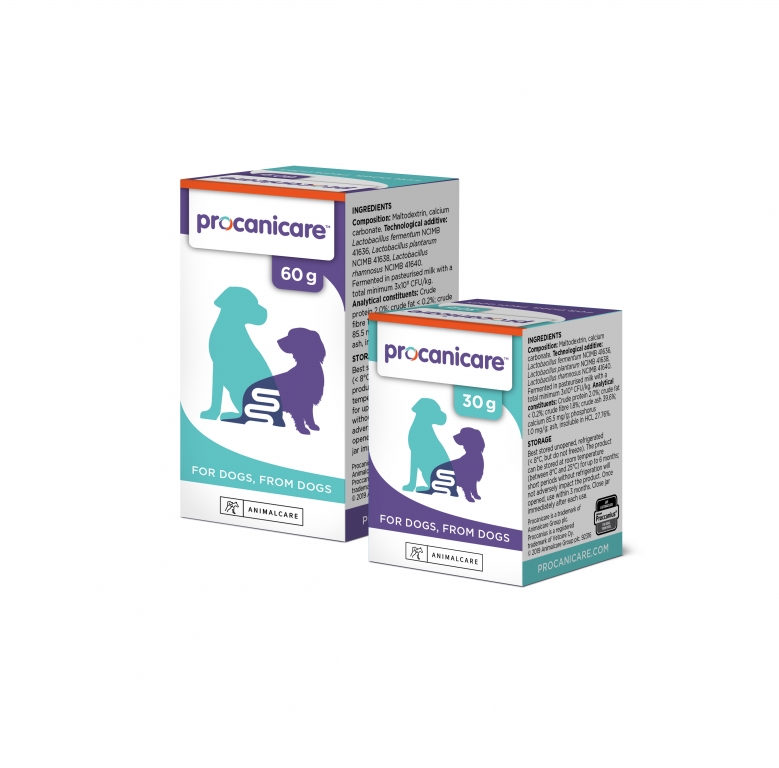
The First ‘for Dogs, From Dogs’ Canine Bacterial GI Support Product Launches In The UK
York – February 2020. The first bacterial GI support product developed from the intestinal bacteria of healthy dogs has landed in the UK. Delivering the benefits of three live strains of canine specific Lactobacillus bacteria, ProcanicareTM, from Animalcare, is an ideal GI support product to maintain balance in the GI intestinal microbiome of dogs, particularly when dysbiosis is a risk.
Adhesion of bacteria to the epithelial cells of the intestine has been shown to be host species specific but most other commercially available canine bacterial GI support products are of porcine, avian or human origin.1 The three live strains of Lactobacillus found in Procanicare were carefully selected after a series of studies isolated the most appropriate species for commercial use from the intestinal microbiome of healthy dogs.2-5
There is increasing evidence of the important roles that the intestinal microbiome has, not just locally in the gut but across the body. Alterations to the intestinal microbiome (dysbiosis) can therefore have widespread impacts on health. It has been shown that, with no intervention, the intestinal microbiome can take years to recover from dysbiosis.6
Many of the effects that bacteria have upon the GI tract and wider body are bacterial species specific.4 The Lactobacillus found in Procanicare have been shown to promote indigenous intestinal commensal populations, reduce numbers of potentially pathogenic bacteria and improve stool consistency.4,5 In addition, Lactobacillus species have been certified by the EFSA to present no pathogenic or antimicrobial resistance risk.
Dr Shea Beasley, Product Development Manager at Vetcare Ltd, was involved in the development of Procanicare and has seen its success in other countries. ‘’The strains of Lactobacillus found in Procanicare have been commercially available in Scandinavia for two years now. It has achieved great success, with Scandinavian vets frequently recommending it in situations where the gastrointestinal microbiota can become unstable such as following antibiotic use and in stressful situations such as travelling and kennelling, as well as when supporting the intestinal microbiome is particularly important, such as during pregnancy and lactation.’’
Available exclusively through vets, Animalcare has produced a range of waiting room materials to help you educate about and promote Procanicare in practice, including a poster, bunting, leaflet and leaflet holder. In addition there is a free webinar for veterinary professionals on the importance of the intestinal microbiome, available to view at https://www.thewebinarvet.com/webinar/the-gastrointestinal-microbiome-and-its-effects.
To find out more or to try Procanicare in your practice, contact your local Animalcare representative via email [email protected] or telephone 01904 487687 or visit www.procanicare.com.
END
PRESS CONTACT:
Rebecca George
Tel: 07974 161108/01449 737281
Email: [email protected]
NOTE TO EDITORS
About Animalcare
Since 1988, Animalcare has been committed to leading in animal health through innovative and trusted products and services to support the veterinary profession. We offer a wide range of animal health products, pet welfare products, practice equipment and identichip® and identibase® - helping reunite lost pets with their owners. We take pride in delivering outstanding customer service and in our responsiveness to customer needs.
A sustainable and passionate organisation, we care about the well-being of animals and the positive impact that healthy animals have on their owners and society.
www.animalcare.co.uk
References
1. Kumar S, et al. Comparative assessment of canine-origin Lactobacillus johnsonii CPN23 and dairy origin Lactobacillus acidophillus NCDC 15 for nutrient digestibility, faecal fermentative metabolites and selected gut health indices in dogs. J Nutr Sci.2017;6:e38.
2. Beasley et al (2006) Lactic acid bacteria isolated from canine faeces. J Appl Microbial. 101:131-138.
3. Manninen. et al (2006) Alteration of the canine small- intestinal lactic acid bacterium microbiota by feeding of potential probiotics. Appt Environ Microbial. 72:6539-6543.
4. Grzeskowiak et al (2014) Pathogen exclusion properties of canine probiotics are influenced by the growth media and physical treatments simulating industrial processes. J Appl Microbia/. 116:1308- 1314.
5. Gomez-Gallego.C .et al (2016) A canine-specifi c probiotic product in treating acute or intermittent diarrhea in dogs: A double-blind placebo-controlled effi cacy study. Vet Microbial. 197:122-128.
6. Jakobsson, et al 2010. Short-Term Antibiotic Treatment Has Differing Long-Term Impacts on the Human Throat and Gut Microbiome. PLoS ONE, Volume 5, Issue 3, e9836
More from Animalcare

 6 years ago
6 years ago  2030 views
2030 views
